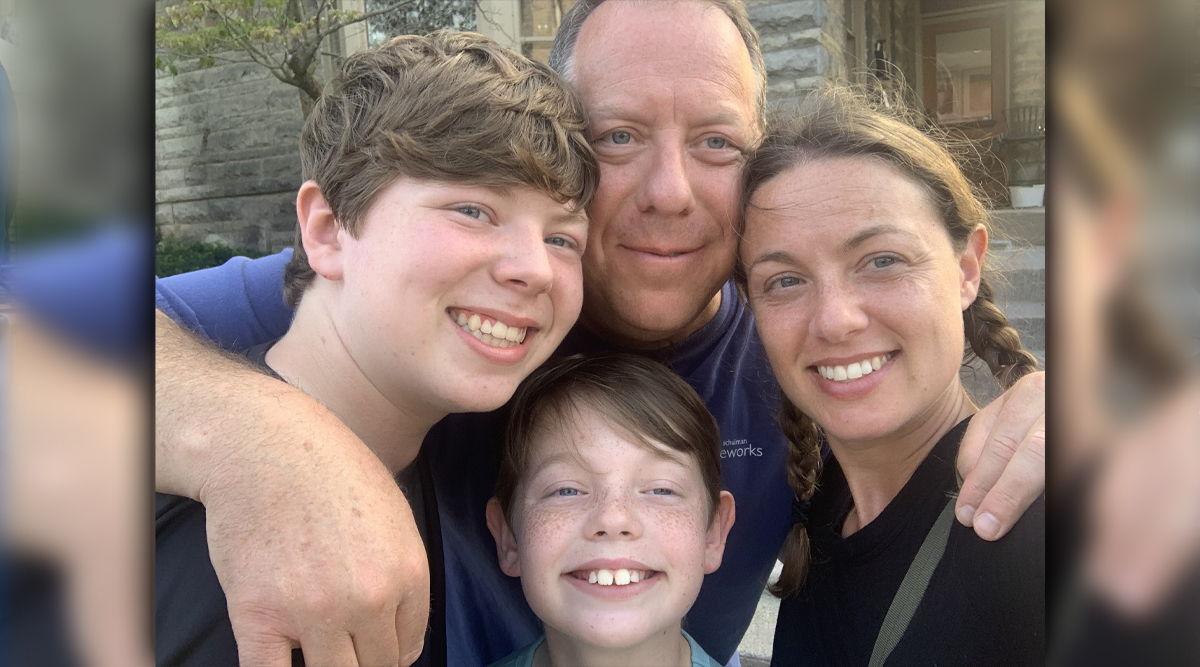Debora Herold was 24 when she was diagnosed with colorectal cancer. Now, she’s enjoying family life and a healthy lifestyle.
By TJ Banes, IU Health Senior Journalist, tfender1@iuhealth.org
In the past two decades, Debora Herold finished grad school, got married, became a mother of two, started a teaching career, and traveled abroad.
To some, that may seem like a normal course of life’s journey. For Herold, that course became reality following a diagnosis of and surgery for colorectal cancer (CRC). She was a 24-year-old graduate student at Emory University living in Atlanta, Ga. when, in 2004, Herold began having symptoms she thought were related to stress. Her boyfriend at the time (now her husband, Brad) encouraged her to see a doctor. On a Friday in February she went in for a colonoscopy and the next day received a phone call telling her she had colon cancer.
“The doctor called me on a Saturday and I thought it was so kind of him to call on a weekend and then I hear the words that I had cancer,” said Herold. Her mom flew to Atlanta to join Herold for follow-up appointments and then they returned to Indianapolis. On March 1, 2004, Herold underwent surgery at IU Health Simon Cancer Center to remove a tumor from her colon.
March is Colorectal Cancer Awareness Month, a reminder that early detection increases the chances of treatment and a cure. Researchers with the American Cancer Society reported last year that CRC is swiftly shifting to a more advanced disease and in younger individuals. Last year, an estimated 153,020 people were diagnosed with CRC, making it the third most diagnosed cancer and the third leading cause of death in both men and women in the United States.
Through genetic testing Herold learned that she has Lynch syndrome, a genetic condition and the most common form of hereditary colorectal cancer.
“It puts people at a high risk for various cancers and women at a greater risk for urinary tract, endometrial, and ovarian cancers,” said Herold.
The American Cancer Society recommends starting regular screenings at age 45. The screening can be done either with a sensitive test that looks for signs of cancer in a person’s stool (a stool-based test), or with an exam that looks at the colon and rectum (a visual exam). Individuals are encouraged to talk to their health care provider about which tests might be the best options.
Herold’s colonoscopy revealed a tumor in the ascending colon. “I was incredibly lucky that it had not spread and that I did not require any additional treatment,” said Herold. She remained in Indianapolis for about a month before returning to Atlanta to complete her degree. She now continues her care with IU Health’s Dr. Douglas Rex and undergoes and annual colonoscopy.
“I remember the day of my surgery, March 1, hearing news anchor Katie Couric on national television talk about colon cancer,” said Herold. Couric’s husband, Jay Monahan died of colon cancer at the age of 42. In 2004, Couric established the Jay Monahan Center for Gastrointestinal Health at the New York–Presbyterian/Weill Cornell Medical Center, which offers screening and treatment for the disease.

In the past 20 years, Herold has enjoyed a full and healthy life. She and her husband Brad have been married 18 years. They have two sons, Ari, 16, and Levi, 13. Herold works as a Teaching Professor in the Psychology Department at IU Indianapolis. She has enjoyed spending time with her family including travel to Israel, Paris, and northern Michigan.
After her diagnosis, Herold began researching diets to help reduce inflammation and eventually stopped eating meat. She began running and has completed both mini and half marathons.
What’s next for her: She is now marking her 45th birthday on May 25 by running a full marathon.
